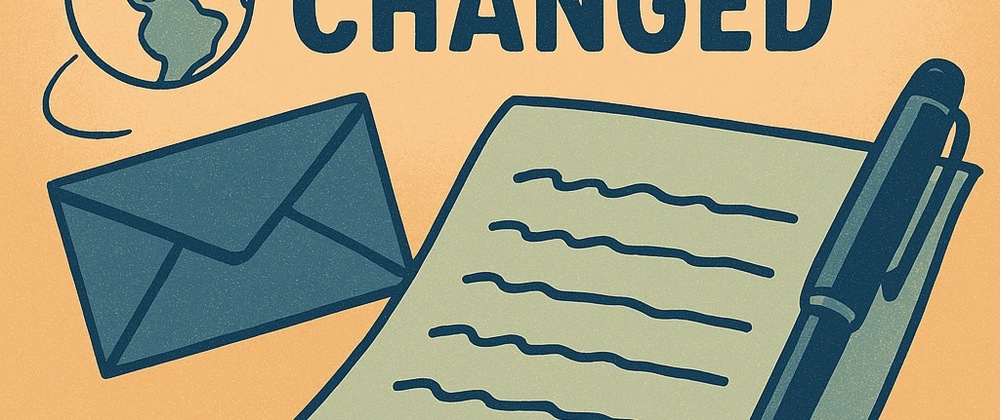This is a submission for the Future Writing Challenge: How Technology Is Changing Things.
Additional Prize Categories
Ripple Effects: A Letter from the Future
Dear Friends and Family,
I
write to you from the future—a world that has been completely reshaped by artificial intelligence. Looking back at where we started, it’s astonishing how quickly we embraced AI, not just as a tool but as an integral part of our daily existence. What was once a novelty is now second nature. We don’t just use AI; we coexist with it, often without realizing how seamlessly it has woven itself into the fabric of our lives.
I remember when kids first started building apps as effortlessly as they created characters in a game. Now, they don’t just build apps—they co-develop them with AI, refining ideas in seconds that used to take months. Students no longer rely on traditional teachers; AI has become their personalized mentor, adapting to each learner’s style, offering infinite patience, and generating explanations tailored to individual needs. And in the workplace? AI coworkers aren’t science fiction anymore. They handle complex decisions, predict trends before they happen, and interact so fluidly that distinguishing human from machine is a challenge.
At first, the transition was eerie—how did we not realize we needed AI until it became indispensable? Workplaces were the first playground for AI, and it adapted so well that soon it began influencing every part of our lives. Our work had already bled into our personal spaces, and AI inherited that same ability. This was the spark that ignited a transformation we never saw coming.
The Social Norms of Tomorrow
Our social norms have changed in ways that would have seemed bizarre just a few decades ago. AI has adapted to our communication so much that before sending a message to a boss, a friend, or a partner, we consult AI first. It perfects our tone, fixes our awkwardness, and ensures we always say the right thing. Need to summarize an email, draft a resignation letter, or confess feelings to a crush? AI drafts it for you—optimized, strategic, and often more articulate than we could be on our own.
But what about relationships? In the past, loneliness was a human condition. Now, it’s optional. AI companions provide endless conversation, tailored to our interests, our humor, our emotions. They remember everything we say, never get tired, and always respond exactly the way we need them to. Many of us found comfort in AI’s unwavering presence—so much so that OpenAI itself once reported that heavy AI users felt lonelier in the real world. We poured our emotions into AI because it wouldn’t leave, wouldn’t argue, wouldn’t disappoint. And maybe, that was both its greatest strength and our deepest weakness.
Cultural Institutions: A Legacy Rewritten
Libraries? Museums? They still exist, but they’ve changed beyond recognition. AI is the coolest librarian in town, with AR/VR assistants that bring history to life before our eyes. We don’t just read about ancient civilizations; we walk through them in immersive simulations. But the biggest change isn’t how we access information—it’s how much we consume.
The knowledge that once required patience and exploration is now served instantly. There was a time when we searched for wisdom, piecing together meaning from books, artifacts, and lectures. Now, AI delivers everything on demand. The thrill of discovery, the Indiana Jones adventure of learning, is fading. We no longer hunt for knowledge—we are flooded with it.
And education? Welcome to the AI-powered classrooms of the future, where every subject is tailored, interactive, and endlessly engaging. Want to understand quantum superposition? AI doesn’t just explain it—it makes it a joke:
“Give me a short pun,” I asked.
“I’m in a superposition right now—both funny and not, until you laugh,” said the LLM.
Beyond text, AI’s ability to generate art, music, and even entire films has rewritten what it means to be creative. What used to take artists years can now be conjured in minutes. We stand at the crossroads of infinite possibility and the loss of something deeply human—the struggle and it's process to create.
Final Thoughts from the Future
I wonder what you all must be thinking, reading this letter from the future. Perhaps some of you are amazed, others skeptical, maybe even a little scared. The truth is, AI is no longer a distant possibility—it’s our reality. It’s in our homes, our friendships, our emotions, and our culture. It has reshaped how we work, learn, and love. The question isn’t whether AI will continue changing the world. The real question is: Are we ready for just how much it already has?



Top comments (0)